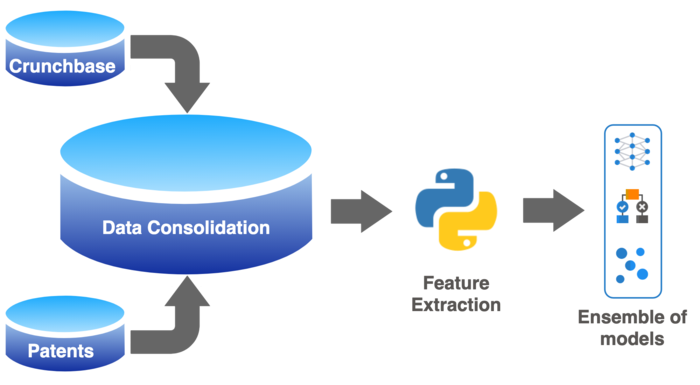Reviewed by Alex SmithSep 8 2021
New research in which machine-learning models were trained to verify more than one million companies has demonstrated that artificial intelligence (AI) can precisely quantify the success and failure aspects of a startup. The outcome is a tool that allows investors to identify the next opportunities.
 The machine-learning pipeline used to train the models. Image Credit: Greg Ross.
The machine-learning pipeline used to train the models. Image Credit: Greg Ross.
A known fact is that about 90% of startups are unsuccessful - about 10% to 20% fail within their first year. This shows the notable risk to Venture Capitalists and other investors in early-stage companies. In an attempt to identify which companies are most likely to succeed, researchers have developed a machine-learning model trained on the historical performance of more than one million companies.
The study findings were published in The Journal of Finance and Data Science. The study demonstrates that the models are capable of predicting the result of a company with up to 90% precision. This implies that potentially 9 out of 10 companies are rightly analyzed.
This research shows how ensembles of non-linear machine-learning models applied to big data have huge potential to map large feature sets to business outcomes, something that is unachievable with traditional linear regression models.
Sanjiv Das, Study Co-Author and Professor of Finance and Data Science, Leavey School of Business, Santa Clara University
The researchers designed an innovative range of models in which the joint contribution of the models outweighs the predictive potential of each one separately. Each model will classify a company by arranging it in one of the success or failure categories with a certain probability.
For instance, a company might end up being successful if the ensemble states that it has a 75% probability of success if undergoing an IPO or “acquired by another company” category, while only 25% of the prediction would fall into the failed category.
The models were trained using the information sourced from Crunchbase, a crowd-sourced platform comprising comprehensive data on several companies. The researchers integrated the Crunchbase observations with patent data from the United States Patent and Trademark Office (USPTO).
With the crowd-sourced nature of Crunchbase, it was known that certain companies lack information. This observation encouraged the researchers to measure the volume of missing information for each company and employ the value as an input to the model. This observation is known to be an important feature in determining whether a company would succeed or fail.
According to lead author Greg Ross of Venhound Inc., the ensemble of models, along with innovative data features, “generates a level of accuracy, precision and recall that exceeds other similar studies. Investors can use this to quickly evaluate prospects, raise potential red flags and make more informed decisions on the composition of their portfolios.”
Journal Reference:
Ross, G., et al. (2021) CapitalVX: A machine learning model for startup selection and exit prediction. The Journal of Finance and Data Science. doi.org/10.1016/j.jfds.2021.04.001.